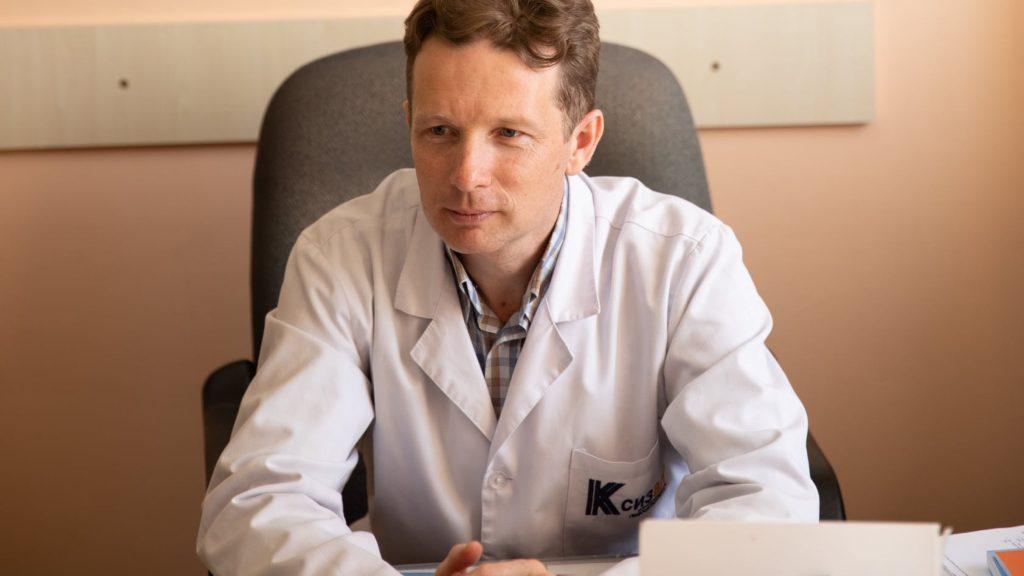Publication date: 11.01.2024

As unusual as it may sound, taking care of your health during wartime should be part of everyone’s strategy for victory. Secondary prevention—screening—can help with this. But what kind, how, where, and who should do it?
Pavlo KOLESNYK, family doctor of the highest category, PhD, Head of the Department of Family Medicine and Outpatient Care, Associate Professor, Director of the Training Center for Family Medicine and Preventive Care of the Medical Faculty #2 of Uzhhorod National University, the first Ukrainian to receive the WONCA Europe 5-Star Family Doctor Award (European Association of Family Physicians) in 2023, was interviewed by thePharmaMedia .
Is it time for preventive examinations in times of war?
– Since the first days of the war, we have been seeing patients who have moved from different parts of Ukraine (the so-called internally displaced persons, IDPs). Initially, of course, people came to us because of acute conditions or exacerbation of chronic diseases. So, in the first year of the war, family doctors really had no time for screening and prevention. He had to deal with those urgent problems and cope with the many times increased patient flow.
But later, many of these people registered and settled in Uzhhorod, and then chose a family doctor for themselves and their children, and the doctors gained experience working in extreme conditions, figured it out, developed their own algorithms, and now have the opportunity to plan preventive measures.
After all, prevention is one of the main areas of work of a family doctor, and, secondly, it is a real tool that helps to avoid the collapse of the medical system.
Can a full health checkup offered by private clinics be considered screening?
– No, in fact, this is a fake that does not take into account either the patient’s characteristics or modern guidelines, and has only one goal – to make more profit from an inexperienced population.
We should also realize the harm of self-appointed screenings “just in case”. They will not help, but they can harm. Some examinations are directly harmful to health (ionizing radiation during CT or X-ray, etc.), while others are indirectly harmful.
The latter certainly includes overdiagnosis using unnecessary diagnostic procedures “for preventive purposes” – all those annual general blood tests, fecal tests for helminths, periodic ultrasounds of the abdominal cavity, breast without indications, etc. All of this can lead not only to increased anxiety, new unnecessary examinations and irresponsible self-medication, but overdiagnosis also encourages people to act: to modify their lives by changing their diet, increasing physical activity, and sometimes taking certain medications “to prevent the development of the disease.” Unfortunately, ordinary Ukrainians are guilty of this, and private medical institutions often encourage it.
What should preventive examinations look like from the perspective of evidence-based medicine?
– First of all, it is worth forgetting about the previous medical examinations, when all people of working age received the same set of examinations: a general blood test, fluoroscopy, electrocardiography, a gynecologist for women, and a urologist for men.
Today, there is a clear scientific strategy on who should visit a doctor, when, how, and how often. Screening is considered the “gold standard” around the world. A screening system involves certain examinations that have proven effectiveness, accuracy, and serve to detect diseases in clinically asymptomatic individuals.
Screening takes place with a certain frequency that varies for different categories of patients. The categories differ by age, gender, occupation, etc.
In other words, there is no “universal” system whereby every person must undergo “systematic preventive examinations”.
After all, all people are different not only in terms of age, gender, race, but also in terms of existing risk factors.
In fact, screening is an American system that is now successfully used by progressive healthcare systems in Israel, the UK, Canada, and others.
We conducted our own research comparing the American screening system with those in 30 other developed European countries. It turned out that all successful screening systems are similar to each other and to the American system. Therefore, we can assume that this system is to some extent universal. Ukraine has not yet implemented such a system.
Source: https://thepharma.media/uk/medicine/33903-turbota-pro-zdorovya-dokazovii-pidxid-10012024
Supported by the ShowUp4Health project
